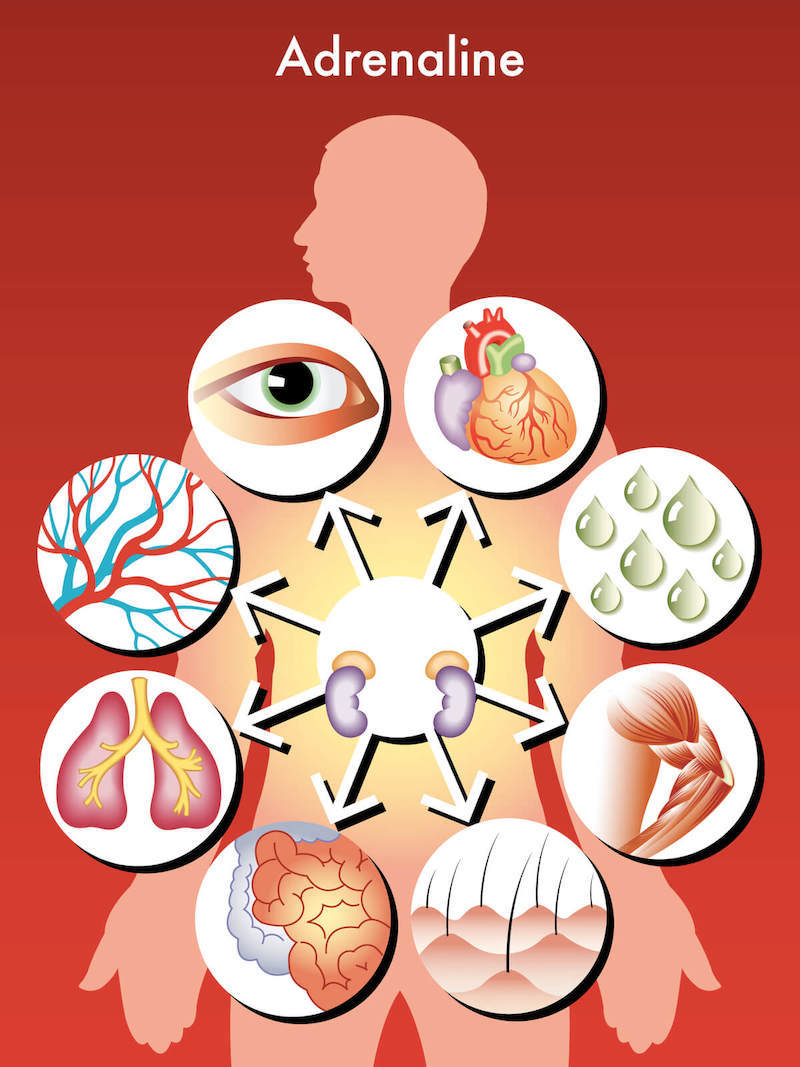Too often "freezing up" is a chronic state.
Ever catch yourself holding your breath, or spontaneously heaving a deep, long sigh?
Maybe going blank or suddenly feeling you can't speak?
Evolutionary psychology holds the answer.

Dr. LaCombe is a 20-year veteran Psychologist and Consultant whose passion is leveraging the power of the autonomic nervous system for becoming a better version of yourself.
Updated: March 20, 2022

Many people are aware that as mammals we’re wired for fight or flight.
When you face a life threatening situation, you will run away—exactly what dozens of New Yorkers did on that fateful day in 2001.
When "flight" is not possible, you'll stand your ground and "fight"—unless the situation makes that an equally bad option.
If your nervous system is overwhelmed, you'll go into freeze. It's the next-in-line survival strategy. Sometimes it's a one-off event as in nature.
Other times, especially in modern day living, the freeze response comes on seamlessly. It's just the last thing in a string of events that over-stimulate the capacity of your nervous system to process at one go.
The nervous system is "full" and down regulates "unimportant" processes to regroup its energy reserves.

You find yourself staring at the computer screen suddenly realizing 20 minutes have gone by without you even noticing.
If you enjoy nature shows (no, not March of the Penguins 🙂 you’ve probably already seen the freeze response. A predator will ordinarily ignore prey that is not moving, for fear of contracting disease.
When “fight or flight” is NOT an option, the autonomic nervous system goes into a freeze response and the animal becomes immobilized.
In the last moments of the chase, when there's literally no possibility of “fight or flight”, the prey will feign death by “playing possum” hoping the predator will believe its damaged goods (ie. diseased).
The freeze response is hard-wired in our reptilian brain.
The reptilian area of the brain was first in our evolutionary development. It holds our basic instincts.
Together with the mammalian brain these areas are responsible for our fight, flight and freeze responses.

The phrases “scared stiff” or “frozen with fear” reflect this mammalian characteristic. A deer that’s “frozen in the headlights” is responding likewise.
Freezing up is NOT a choice
I've heard more than one story from clients—former bank clerks—who've froze in the face of a robber demanding money. For months afterwards, they're disturbed by their reaction.
Similar to others who've experienced a traumatic event, they're filled with shame and completely baffled why they reacted that way.
It's helpful when they learn that the freeze response is an automatic, non-conscious reaction that occurs when all mammals face an overwhelming threat.
Their response was a last ditch effort to save themselves.
In some instances it is the optimal survival tactic.
Where's the 'ol fight - flight' when you need it
Our survival instinct is extremely strong. It's not easily overridden by the "thinking" brain, our neocortex (i.e. our intentional self). (See diagram above.)
In the same way that you cannot tell yourself to have a good night sleep, you cannot tell yourself not to freeze.
The body chooses. It's the optimal response at the time.
A new way of looking "freezing up"
In a modern age it's easy to forget our evolutionary heritage has a greater impact on our intentions than we think. New and exciting theories from neuroscience are revealing new possibilities for improved human health and well-being.
This new perspective suggests that "freezing" doesn't refer just to being motionless. It also refers to how the nervous system manages arousal during moments of traumatic stress.
It's this type of freezing up that causes many of us to develop trauma symptoms long after the danger has passed.
In other words we may go into freeze yet not be aware of it long after the traumatic event.
Let me explain.
During a traumatic event an enormous amount of energy is released by our neuroendocrine system. This enables us to fight or flee.
You feel this adrenalized energy in the shaky hands you have after a "close call" driving incident.
It's the nervous system releasing that excess hormonal energy.

Adrenaline impacts many areas of the body
As you can imagine, fight or flight is not always an optimal strategy in modern life.
For example, if your boss infuriates you, you don't really want to punch his lights out (although imagination can be fun 🙂
If your car is about to collide with another there is usually little advantage to jumping out of the car (ie. a flight response)—even you had time to do so.
However, if there's sufficient resiliency in your nervous system you'll be able to release this energy without being traumatized.
For many people however this life-threatening experience sets the stage for dysregulation (a chronic state in which the nervous system is under functioning).
The energy mobilized by the perceived threat gets "locked" into the nervous system when we go into freeze.
In these situations you may not even realize that you went into freeze, yet several months later you're still reeling from the effects of an accident.

You're standing outside, catching up with a friend. You're listening to the words but you're not taking them in. You're staring off into space.
Or you don't notice that you're breathing at the top of your lungs. So it's not unusual that you have these deep sighs ever so often. The deep sigh is the nervous system catching up on its oxygen intake.
You see, the nervous system hasn't yet discharged the energy that was mobilized for fight or flight. It's being held in the body—including in the muscles and fascia.
Implications of the 'freeze response' for psychotherapy
What's even more intriguing is the theoretical possibility of preventing post-traumatic symptoms. It appears that the more the nervous system is dysregulated, the greater is the tendency to move into freeze. (See Runnin Scared below)
I find this exciting because I look forward to a time when keeping our nervous system regulated is as common as dental hygiene.
Equally exciting are the implications for somatic therapy. As our clinical practices1 show, integrating the body into psychotherapy tends to restore resiliency to the nervous system, a key factor in its efficient regulation.
External Links
Here's a more comprehensive look at the freeze response. These researchers differentiate the initial "stop, look, listen" type of freeze that happens when mammals first encounter danger from the "tonic immobility" or "fright response" that happens when there is no option for fight or flight.
Does fight or flight need updating
Why you might not scream
Related Topic
Runnin scared
Notes
1. I understand that this outcome is more easily identified in body-oriented psychotherapy. Since few clinical trials have been conducted so far, this observation remains outside mainstream psychological practice.
Resiliency may well be a common outcome in other psychotherapies however as I understand it, resiliency is not often tracked. That is, it isn't noticed because therapists aren't looking for it. Body psychotherapists are trained to look for it.
References
Levine, Peter, A. (1997). Waking the Tiger: Healing Trauma. Berkeley, California: North Atlantic Books.
Porges, Stephen, (1995). Orienting in a defensive world: Mammalian modification of our evolutionary heritage. A polyvagal theory. Psychophysiology, 32, 301-318.
Rothschild, Babette, (2000) The Body Remembers: The Psychophysiology of Trauma and Trauma Treatment, London: W. W. Norton & Company.
Scaer, Robert C., "Precarious Present" in Psychotherapy Networker, Nov/Dec 2006.
Scaer, Robert, C., (2005). The Trauma Spectrum, New York: W. W. Norton & Company.
Scaer, Robert C., (2001) The Body Bears the Burden, Haworth Press.
Comments on the Freeze Response

Brooke (Melbourne, Australia)
Froze on the spot
first realised that I freeze in the face of danger when the real estate popped round and brought the keys to my flat instead of the one opposite. I thought someone was breaking in. I had a newborn in my arms and froze on the spot. I tried to call out and scream, but nothing came out.
Whenever I sense danger the same thing happens.I got lost in the Cambodian jungle one night when I got separated from my group as I started getting bitten by ants. I had no torch and was really scared, but for the life of me, I could not call out or scream. The best I could do was no more than a whisper.
I dreamt last night that I opened the front door and a stranger pushed past me and I could not warn my husband and kids, so even in my dreams I freeze up.
What if one day I get attacked, that’s my biggest fear. Can I overcome this? What can I do?

Shrinklady
Hello Brooke, yes, I’m glad you asked. You’d want to take care of this at some point sooner than later because – as you’ve discovered – being in ‘freeze mode’ puts you at obvious risk.
And getting lost in a Cambodian jungle . . . Wow, that’s freaky. I can understand how scary that must have been. Of course, the worst part is not being able to call for help.
I want you to know too Brooke in case you were wondering, your body is choosing to go into freeze – you have no choice in the matter. So choosing to not go into freeze is not an option.
There is a solution. You can solve this problem by improving the capacity of your nervous system to manage activation – that is, get it self regulating again. (Activation is the amount of energy flowing through your body and is felt through body sensations and can even be measured through HRV (heart rate variability) devices.
Activation is also felt as an arousal pattern – the increased energy flow whenever we do, think or feel something. We’re always in an arousal pattern – it just depends on how hyped we are – whether we notice it or not.
When you bring your arousal down to baseline regularly, it starts to improve your nervous system.
With repeated practice you can even lower your overall activation level so that your propensity to move into freeze is much lower.
You see, right now your nervous system is compromised in it’s ability to process stimulation.
You fill up too fast and instead of going into flight or fight or even being able to pause (giving you time and space to make a decision), it’s on a hair trigger to react.It’s doing this to keep you safe. (Though it doesn’t realize you’re living in a modern age without life threatening dangers all around.)
Through no fault of your own, it has “learned” that’s it’s best to be safe than sorry (it would rather go into freeze than risk fighting or fleeing).
When our activation is high, it sends a message to the reptilian part of the brain that it’s a dangerous world. It’s as if you’re on alert. Then when it perceives something new or sudden it takes action rather than giving you time to consider what to do.
Like you had no time to consider who the real estate person was. You immediately went into react mode (which in your case was freeze).The easiest and in my opinion, the fastest way to improve your nervous system is with a body-based therapist. They know exactly what I’m talking about.
Alternatively, you can engage in body based activities that have also been proven to help: yoga, tai chi, Akeido. Even learning to play the flute and singing can be beneficial (because they improve your capacity to take in breath.)
I’ve probably mentioned it already on this page, I do have some great tools to help lower your activation. They’re based on the work of such leaders in the field as Peter Levine, Pat Ogden, Daniel Siegel, Bonnie Badenoch to name a few. You can learn more about them here: Inspired By
I hope this gives you some ideas on how to proceed.
All the best Brooke,
Shrinklady

John
Trigger by classmate
A certain person in one of my classes (a 30 person class) triggers my freeze response, and this freeze response follows around me all the time, even when I’m not in this class.
I think I’m having a freeze response because there is no way out of this situation, I am stuck with this person in my class all the way until June. I think I have this because of past traumatic experiences with this person. However there is no current threat because I don’t even talk to this person at this point.
What can I do to calm down my freeze response. Is forgiveness (something I’ve tried and failed to do) necessary? I think this freeze response is affecting all areas of my life, from my academics to my feeling of happiness.

Shrinklady
Hi John, oh my goodness, I can imagine you’d be in a quandary on how to deal with this situation especially if it’s out of the question to drop the course.
One thing…no need to worry about “forgiveness” at this point. I can appreciate your efforts but your freeze response is a physiological reaction coming from an area of the brain that is not easily accessible by thoughts or false sentiments.
In my experience forgiveness happens quite naturally when you’ve passed certain emotional milestones.
As you work on yourself, that trigger will cease to exist.** So ‘jumping the queue’ so to speak rarely works. The first thing to understand is that while this person is triggering the freeze response in you, it’s rare that one person is the sole source of your reaction. So in fact there’s two areas to work on:
1) getting your overall activation down and,
2) working through the trauma associated with the person.
In regards to #1, there’s a brain rule of thumb that’s good to know:
The higher your activation, the more likely you are to be triggered. So you can do much just in focusing on the job of getting your activation down.
I’ve mentioned several strategies on this site to lower your activation. I’d encourage you to try them and find one you can do daily.
Then as your nervous system bucket becomes less full, you’ll have more “room” to tolerate the spike associated with any trauma. It won’t take away a trauma, but with this extra “room” you can have a some measure of control over your reaction. That in itself, can help you to feel a little better.
By the way, thinking along the lines of “no way out of this” is something you want to avoid. Because you’re inadvertently re-triggering yourself. That will do more to keep you stuck especially when you’re outside your class.Indeed, the best strategy is to “catch yourself in the act”.
That is, when you’re outside your class and you find yourself thinking of this person, right there and then, work to get your activation down. So you would let go of the thought and immediately draw your attention to focus on the sensations in your body. Then using body-based skills, get that arousal pattern down.
This will be tremendously helpful in not only lowering your overall activation, it will help you to lessen the power this person has over you.
Again, keep in mind that it’s your high level of activation that’s making you more prone to go into freeze when you’re away from this person.
The second task above – working through the trauma associated with the person – requires specialized work.It’s far easier to do this work with a trauma therapist.
You see, you’re probably getting flooded with the person in your class. That will make it very hard for your brain to learn new things – even stuff your instructor is trying to teach.
That is, if you feel under threat, the last thing your brain wants to focus on is academic material.
So with a trauma expert, you’d be working via imagination as you work through the activation associated with the trauma. It may even be necessary to work through activation associated with similar or related traumas before you even get to this trauma. (Sometimes a trauma is coupled up with other issues from our past.)
Shrinklady
**PS. John, this is the hardest thing for folks to understand at the outset. However, after years of working with trauma – including my own personal work – it’s clear:
You know you’ve reached “forgiveness” naturally when you can see how this person has actually helped you to see other even more important issues that were playing a much deeper role in your life.

Michi
Can’t talk in freeze mode
Hi, I freeze when it comes to talking. Something happened to me when I was a little kid and I just stopped talking. As an adult I can’t talk when I’m one-on- one with someone… I go almost mute. This isn’t helpful in therapy.
Although my therapist is very patient and has gotten me to the point where I can talk about some things. I just can’t talk about my traumas. I also freeze in my dreams… I’m almost helpless and I can’t move.
What can I do to move myself out of freeze mode so I can talk. It really makes therapy slow and I’m not getting much relief from my traumas. I also dissociate a lot.
But it has gotten better with therapy. I started going because I was numb. But with therapy I have access to some of my feelings now and I’m not numb all the time.
I think the numbness went away because I’m in the presence of a kind person but I don’t know. I’m lonely a lot because I can’t make friends because I can’t talk on a personal level.

Shrinklady
Hi Michi, thanks for your comment. I imagine this situation has been extremely limiting in your life – I can certainly understand why making friends is proving to be difficult.
And of course, you would feel lonely. That’s only natural given the circumstances.The good news is that you’ve started your healing journey and have noticed some improvements. It sounds like your therapist sincerely cares about you.
This is really important because in working with her, you can have some measure of safety to allow your feelings to surface.In time, your nervous system will learn to tolerate a geater range of different emotions.
You see, this safety issue is the problem. When we’re in freeze mode, our primitive lizard brain doesn’t feel safe despite the fact that “you” might think otherwise. What’s equally important is that it seems that social engagement is triggering for you. I imagine in your sessions it’s difficult for you to maintain eye contact with your therapist.There’s several things that you and your therapist can do together to make the process easier and to speed up your healing.
The idea is to operate from the perspective that the reptilian brain needs safety. You must use the language of that part of the brain (talking cannot access it very well) and then modulate the up and down rhythms of your nervous system so that you stay within your Comfort Zone.
The reptilian brain responds to body sensations, movement and imagination. Use these in your sessions to attend to and be sure your nervous system is staying within a range that’s tolerable for you. (You can use the 12 Second Chill repeatedly in your sessions to assess where you are from moment to moment.)
Please don’t worry about not being able to talk about your traumatic events. Most of my clients feel much better way before we get to working with their trauma. The healing is on the way there – it’s not about processing each traumatic incident.
I wish you all the best,
Shrinklady

Skydiver
Moving into freeze skydiving
Hi! I am a skydiver who has been away from the sport for over 20 years, and have recently started jumping again. I am experiencing the freeze response right as I’m landing my parachute, and basically hit the ground limply.
I am waiting to jump again until I figure out how to bypass or overcome this response.
Any ideas for me?
Thanks, Susan

Shrinklady
Oh, I’m glad to hear that you’re waiting until things have sorted themselves out Susan. That’s a wise move. It sounds like parachuting could be quite dangerous for you otherwise.
You’ve already guessed that your body is going limp just before you hit ground because it’s moved into freeze.
As I see it, although mentally you’ve successfully worked through the fear of jumping out of a plane, your body’s not convinced it’s a good idea.
Freeze is the last survival strategy the nervous system can use when the other two – fight or flight – aren’t available. So the reptilian lizard brain takes it cue and hijacks your conscious control.
In other words, if fight or flight are out of the question…there’s no place to run to and no one to fight, you’ll automatically move into freeze.
What’s important to understand is that you have absolutely no choice in the matter. And until your nervous system is self-regulating again, there’s no guarantee it won’t do the same thing next time.But there’s more……a freeze response can happen whenever you’re maxed and your survival is at stake. Notice that I didn’t say ‘when you’re afraid’.
So if you jumped again now you risk going into freeze before you pull your chute open.
You mentioned you used to jump 20 years ago. A lot can happen in the intervening years since you last jumped regularly. It’s possible that back then the excitement of a jump was well within your Zone. (Your ‘Zone’ or capacity to handle stress and excitement is determined by the health of your nervous system.)
One thing that struck me as interesting Susan was the fact that you’ve taken up parachuting again, and much later in life.This is just conjecture…but when we’re in freeze mode, life seems pretty flat.
The senses are muted.
Some folks who are drawn to extreme sports might be attempting to re-experience a feeling of aliveness. Is it possible that’s what you’re searching for?
As a way of explanation, did you know that the nervous system handles excitement and anxiety in much the same way?
The brain is incredibly resourceful. What’s exciting to one person would trigger high anxiety or sheer terror in another. It’s a matter of perspective, which depends on what’s happening in your nervous system much more than you would think.
My instructor used to say that she believes that folks who entertain such dangerous sports are flirting with the edge of their zone in an effort to feel alive. She says these folks feel “normal” as long as they’re planning the next activity, or on a new adventure. Stop them and they’ll feel the charge bubbling to the surface. That’s when they feel “off” or not themselves.
I was like that, going from high excitement to freeze all the time. I never knew that the need to keep moving, to be doing stuff all the time was just my way of avoiding feeling the constant revving inside me. Looking back I can see that I unconsciously did things that matched what was going on inside me.
Yeah, I think it made me feel normal.If I’d been immobilized and couldn’t keep moving, I’d have really felt the angst.
I’ve met a few folks in my private practice who come to see me for the very same reason. Owing to an injury, they can no longer neutralize the charge in their body through sports or vigorous activities. Now the energy is backing up and they’re feeling anxious, maybe for the first time in their lives.
The effects of negative experiences can accumulate in the nervous system. If these experiences are outside your Zone (or window of tolerance) and have yet to be processed, they’ll “fill your bucket” (ie nervous system).
A “full” bucket always puts you at risk of moving into freeze, or of being traumatized.You asked what you can do? I imagine Susan you were looking for a quick and easy solution and I’m afraid I don’t have one. I think your best defense against freeze is a healthy self regulating nervous system. And for this I suggest you find a good SRT therapist* and give your nervous system a thorough check up.If you embark on a therapeutic journey and are eager to progress quickly you might add in activities such as yoga, tai chi, aikido or anything that strengthens your core muscles. These are known to help re-set the nervous system.
Thank-you again for your question.
Best wishes on your journey,
Shrinklady
PS. * An SRT therapist is body-based and uses self-regulating techniques.
PPS. I assume you know that I have body based tools. These will help immeasurably whether you go to therapy or take up any of the activities I mentioned.

Paul (Belarus)
Moving into freeze after Shamanic Ceremony
Dear Dr. LaCombe,
Thank you so much for this insightful article. About 6 months ago I had some shamanic ceremonies in Peru. During the ceremonies I experienced extreme terror, paranoia, anxiety, despair, and isolation due to a perceived threat.
I went into a freeze mode for an extended period of time (probably a couple of hours). I literally tried to flee from my body.
I believe that freeze energy is now stuck in my nervous system – I am having difficulty functioning in everyday life.
Could you please suggest some way of discharging it?
Thank you in anticipation.
Kind regards,
Paul

Shrinklady
Yes, I would agree Paul…it sounds as if your nervous system is still dealing with the aftermath of that event and remains stuck in freeze mode. Given the description of your experience it sounds as if you were traumatized.
Just so you know Paul, trauma re-sets the brain at a higher level of activation – it means you’ll likely be more reactive, less tolerant of stress and emotions, more guarded in your interactions with others and a host of other emotional and physiological symptoms. It is possible to move out of freeze and I’m glad you’re reaching out for some answers. While freeze has several psychological symptoms, it’s actually more effective to work through the body to relieve them.
The easist way is to get some touch therapy with a massage therapist who specializes in trauma.
Unfortunately, these types of practitioners are quite hard to find although the field is rapidly changing and you could search the TraumaHealing.org site for someone in your area.
I’d also recommend a body-based therapist and I’d choose someone who has a lot of experience working. (You can also find therapists listed at the site above.) If you were hoping to do this on your own Paul, I think it might be possible however it may take longer and there are no guarantees.
It would take several practice sessions gently working with your body, tracking sensations and allowing for instances of discharge.You could begin by getting the 12-Second Chill eBook that I offer free on the site.
Generally speaking, you’d want to work with your body – not push it hard. For instance, keep your exercise routine in the moderate zone. Don’t force yourself to relax (Your body may not be ready). Instead, relax in small bits.
To achieve the release you want, stay attuned to slight variations in the sensations you’re tracking.
I wish you the best,
Shrinklady

Jodi (Colorado)
My mother had a traumatic fall about 4 years ago. Since then she has been “freezing” and falling. It started when there were unexpected noises or movements close to her and it now occurs almost and can occur by just bending over to pick up a piece of paper.
She has seen numerous neurologists and a few psychologists. She did try EMDR and had some success, but was told she couldn’t continue it until they discovered the physical reasons she was falling.
After numerous tests the doctors have found NOTHING physically wrong with her. They think that neurotransmitters may be blocked and have put her on some medication to help that along with anxiety meds. They think she may have Stiff Persons Disease, but she tested negative for the antibody.
Do you have any suggestions on next steps for therapy or any other type of help?
We could use all the help and suggestions we can get!

Shrinklady
Hi there Jodi, it might be that she’s going into freeze (and collapse) owing to the trauma she experienced. The noises are setting her off – when we’ve experienced a trauma we can be extremely sensitive to noise.
If you’re in Colorado then I would contact Robert Scaer M.D. or Dr. Peter Levine. Dr. Levine has been responsible for training hundreds of practitioners in the area of trauma.
You can reach Peter through his organization and they may be able to help you: http://www.traumahealing.org. Dr. Scaer at: https://www.youtube.com/watch?v=xhUTEaNmCJg
Hope this information leads to some help for your mother.
Best,
Shrinklady

Jane (SYDNEY, Australia)
Hi Suzanne , thanks for your helpful information, I have had some episodes at work where I have frozen in emergency situations , and as a Nurse this has been very frightening for me .
I am a very anxious person , and I understand to have less anxiety to begin with is necessary , and I would really like some strategies to bring my brain back in the mean time !

Shrinklady
Oh for sure Jane,
I definitely can recommend some brain strategies. The priority is to get your nervous system working optimally.
If you sign up to get the 12-Second Chill, that'd be a good start (see the ribbon above).
Best,
Shrinklady

Luís (Portugal)
Hi from Portugal, thank you very much for your article. I wonder, can we program our brain to react in freeze responses?
For an example, in front of a car usually the person tend to stop instead of run. is it because our instinct is not used to deal with this kind of situation?
can we learn to react thru mental exercises?
Kind regards,
Luís

Shrinklady
Well, those are some interesting questions Luís. I might have to ask a colleague or two. But in the meantime, my guess is…yes, we can train ourselves to react differently–but only for specific situations–and for only situations we have had actual experiences with.
If you were prone to going into freeze mode when seeing an oncoming car, you’d have to practice actually facing an oncoming car many times until it became an automatic response to run. You might run into some significant collateral damage in attempting to override this basic survival strategy!
The military uses this type of training all the time. They train soldiers to react in a specific patterned way given certain cues.
The soldiers “over learn” certain reactions until they are done without thinking.That’s the nature of procedural memories (or patterns), they’re done without thinking. Walking, playing the piano and eating are all done using the procedural memory system. We use procedural memories all the time, we just don’t realize we’re using them.
But even with a behaviour, like running across a street, if your nervous system becomes tapped out, you will freeze despite your learning.
In the military, when a soldier has faced too much trauma for the nervous system to handle, he or she will freeze. (This freeze response used to be called “shell shock”. Today, it’s called PTSD or Post-Traumatic Stress Disorder.)
However, there’s a much easier way to have reactions like James Bond. Lower your level of activation.
This will allow you to have good reaction times. The lower the activation in the nervous system the less prone we are to the freeze response and the more our intentional brain has the space to do what it wants. We will have time to say to ourselves, RUN.
Shrinklady

Annie (Washington DC, USA)
I am actually going thru therapy for this. Using Peter Levine\’s CDs and working with therapist too. We do EMDR when anything comes up from the guided imagery. Working great.
Maybe someday I will feel totally healed from the sexual abuse. Thanks for posting this. I am sending many to your site to read your article.
Annie

Shrinklady
Thanks Annie, appreciate your comments. I too have found using the body in psychotherapy helpful–both personally and professionally.
Shrinklady

Walter
I have not seen a therapist yet, i am still not sure if I am comfortable with that idea….
I do recognize the zones in my life, and know that most of the time I am operating in the crisis or freeze zones. I can never just fall asleep at night, my mind is always racing about one thing or another. When I am with a partner it upsets me that they can fall asleep so easily and I am left inside of my brain that is moving like Grand Central Station at rush hour.
I think having this information is very useful and I am going to try and apply that to my life, just taking one issue and one box instead of the whole warehouse so to speak. I look forward to hearing more on this topic in the future, thanks!

cb
SO helpful. I realize that I operate in crisis mode and freeze mode MOST of the time. Because I realize that something is wrong, I instinctively try to fix it, or think and ruminate about every issue that deeply concerns me about my life – of which there are many.
I’m BP2, and currently undergoing a med switch, so my thoughts are racing……I thought that “thinking and trying to rationalize” would calm me down, ” but i realize that I am in freeze mode/survival mode right now, and wont really learn a lot….I tend to end up worrying, catastrophizing, etc. Add to this that I have experienced SEVERAL traumatic events over the past two years and it was necessary for me to move home, at the age of 37 , with a grandparent who neither understands bipolar disorder, nor the need for rest or low stress conditions……employment, financial issues, relationship issues, self esteem, etc….all seem to be pouncing on me at the moment…..and i realize my nervous system is going crazy.

